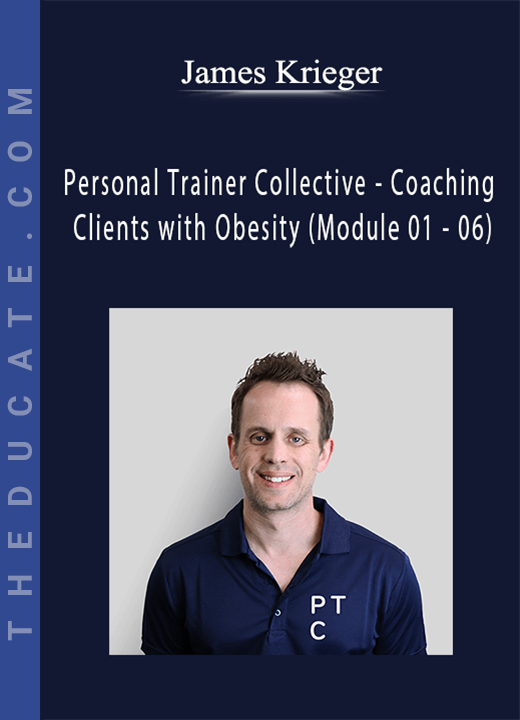Description
INSTANT DOWNLOAD

James Krieger – Personal Trainer Collective – Coaching Clients with Obesity (Module 01 – 06)
What will James teach you?
Coaching Clients with Obesity is specifically designed to empower the personal trainer when dealing with the unique challenges of clients with obesity. Obesity is a global epidemic, and clients with obesity need special consideration from both a nutritional and exercise standpoint.
Course Syllabus
-
Module 1: Obesity – A Unique Challenge
-
Unit 1: What is Obesity
- Define obesity
- Understand the health implications of obesity
- Identify the countries with the highest and lowest obesity rates
- Understand the spread of obesity in the United States of America
-
Unit 2: The Primary Driver Behind Obesity
- Understand energy balance and how it impacts body weight
- Identify the components of energy balance that are driving obesity
- Understand how the environment can impact food intake
- Understand how palatability and energy density can impact food intake and food-seeking behaviours
- Understand optimal foraging theory and how it relates to overeating
- To identify how food technology has impacted the reinforcing characteristics of food
- Define “settling point” and understand how palatability and reward impact it
- Understand how food variety impacts calorie intake
-
Unit 3: Secondary Drivers of Obesity
- Identify secondary factors that are contributing to the obesity epidemic
- Understand how food form can impact appetite and satiety
- Understand the mechanisms via which sleep loss can contribute to obesity
- Understand how inactivity can impact food intake
-
-
Module 2: Nutrition Strategies for Weight Management
-
Unit 4: Energy Balance and Setting Calorie Targets
- Understand the adaptations that occur in the body during an energy deficit
- Identify the advantages and disadvantages of small and large energy deficits
- Be able to calculate calorie targets for weight loss
-
Unit 5: Setting up a Sustainable Nutrition Plan
- Identify the characteristics of a sustainable, reduced calorie diet
- Understand appropriate protein intakes for the obese client
- Define energy density and understand how to apply our knowledge of energy density to construct a high-satiety diet
- Understand the basic mechanisms behind the efficacy of popular diets
- Understand basic semi-quantitative and non-quantitative dieting strategies
- Understand the importance of dietary adherence
- Identify how to alter food environment to enhance adherence
-
-
Module 3: Exercise and the Obese Client
-
Unit 6: Components of Energy Expenditure
- Identify the components of energy expenditure
- Understand the relationship between metabolism and bodyweight change
-
Unit 7: Non-Exercise Activity Thermogenesis (NEAT)
- Define non-exercise activity thermogenesis (NEAT)
- Understand the magnitude of inter-individual variances in NEAT
- Understand what happens to NEAT with age, weight loss, exercise, and obesity
-
Unit 8: Impacts of Endurance Exercise and Interval Training on Energy Expenditure Fat Loss
- Understand how endurance exercise impacts energy expenditure during exercise and during recovery
- Understand how interval training impacts energy expenditure during exercise and during recovery
- Understand how interval training compares to endurance training for energy expenditure and fat loss
-
Unit 9: Impacts of Resistance Exercise on Energy Expenditure and Fat Loss
- Understand how resistance training impacts energy expenditure during exercise and during recovery
- Understand how volume and intensity can impact energy expenditure and fat loss
- Understand how resistance exercise compares to aerobic exercise regarding the effects on metabolism and 24-hour energy expenditure
-
Unit 10: Impacts of Exercise on Abdominal Fat & FFM Retention
- Understand how exercise intensity may impact abdominal fat
- Understand how exercise may impact fat-free mass retention during weight loss
- Identify the difference between fat-free mass and muscle
- Understand the interaction between resistance training and fat-free-mass retention
-
Unit 11: Impact of Exercise on Appetite
- Understand the different appetite responses to calorie restriction and exercise
- Identify how exercise may impact appetite
- Understand how exercise intensity may impact appetite
-
Unit 12: Impacts of Fasted vs Fed Exercise on Energy Expenditure and Fat Loss
- Identify the proposed mechanisms for fasted exercise improving fat loss
- Understand the research findings regarding fasted versus fed exercise
-
Unit 13: Exercise Training Modalities for Obese Clients
- Understand the unique challenges when programming exercise for an obese client
- Identify which modalities of aerobic training, interval training, and resistance training may be most appropriate for obese clients
- Apply programming principles to hypothetical examples of obese clients
-
Unit 14: Strategies for Increasing NEAT
- Identify strategies to help increase NEAT and how to incorporate them into a client’s lifestyle
- Understand how to use activity tracking devices to help increase a client’s NEAT
-
-
Module 4: Lifestyle Factors for Obesity
-
Unit 15: Sleep & Self Monitoring
- Understand strategies to enhance sleep quality and quantity
- Understand the relationship between self-monitoring and success
- Identify how self-monitoring tools can be used to enhance success rates
-
-
Module 5: The Bigger Picture – Adherence and Long-Term Success
-
Unit 16: Long-term Weight Maintenance
- Identify the reasons why long-term weight maintenance success rates are low
- Understand the characteristics of successful long-term weight maintainers
- Understand the importance of physical activity to long-term weight maintenance
-
Unit 17: Psychology of Obesity – Strategies for Adherence and Successful Weight Loss/Maintenance
- Identify the psychological consequences and comorbidities of obesity
- Understand strategies to set a client up for success
- Understand variables associated with successful adherence, weight loss, and weight maintenance
- Understand variables associated with lapses in adherence, and how to create strategies to limit lapses
- Understand how motivation, intention, and planning are related to behavior
- Understand the advantages of flexible versus rigid approaches
- Understand potential sources of tension during weight maintenance, and how to manage or resolve that tension
-
-
Module 6: Consultation and Practical Programming
-
Unit 18: Consulting with an Obese Client and Practical Application
- Identify the phases of consulting an obese client
- Identify the information you need to gather during each consultation phase
- Understand the basics of programming for an obese client
- Understand how to use this information to make adjustments based on progress
- Understand the special factors you need to consider when working with obese clients compared to the general population
-
Unit 19: Summary
-







5 reviews for James Krieger – Personal Trainer Collective – Coaching Clients with Obesity (Module 01 – 06)
There are no reviews yet.